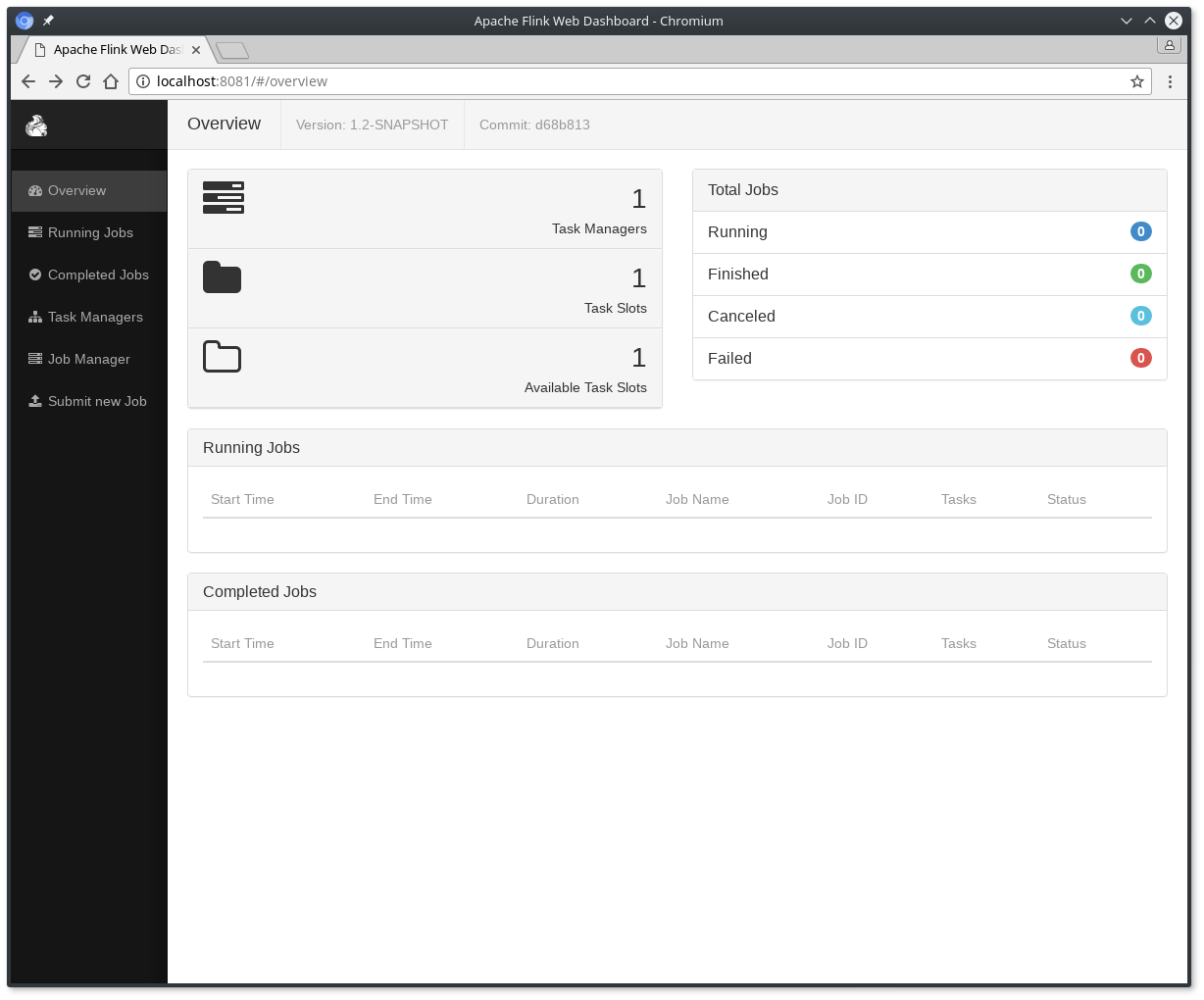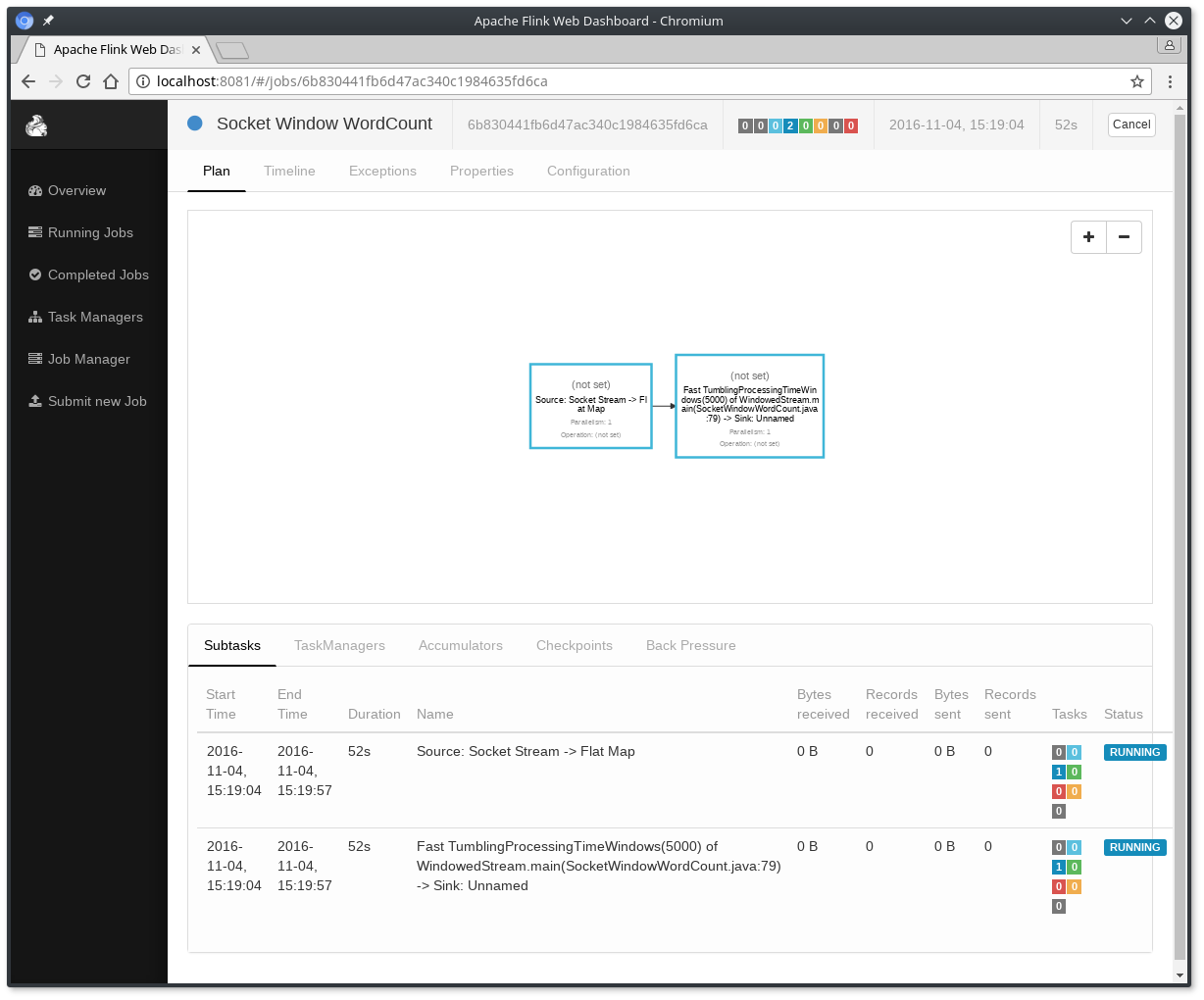flink入門教程
原文連結 譯者:清英
安裝: 下載並開始使用Flink
Flink 可以執行在 Linux, Mac OS X和Windows上。為了執行Flink, 唯一的要求是必須在Java 7.x (或者更高版本)上安裝。Windows 使用者, 請檢視 Flink在Windows上的安裝指南。
你可以使用以下命令檢查Java當前執行的版本:
java -version
如果你有安裝Java 8,命令列有如下回顯
java version "1.8.0_111" Java(TM) SE Runtime Environment (build 1.8.0_111-b14) Java HotSpot(TM) 64-Bit Server VM (build 25.111-b14, mixed mode)
** 下載和解壓 **
- 從下載頁下載一個二進位制的包,你可以選擇任何你喜歡的Hadoop/Scala組合包。如果你計劃使用檔案系統,那麼可以使用任何Hadoop版本。
- 進入下載目錄
- 解壓下載的壓縮包
$ cd ~/Downloads # Go to download directory
$ tar xzf flink-*.tgz # Unpack the downloaded archive
$ cd flink-1.2.0
Start a Local Flink ClusterMacOS X
對於 MacOS X 使用者, Flink 可以通過Homebrew 進行安裝。
~~~bash
$ brew install apache-flink …
$ flink –version
Version: 1.2.0, Commit ID: 1c659cf ~~~啟動一個本地的Flink叢集
使用如下命令啟動Flink:
$ ./bin/start-local.sh # Start Flink
通過訪問http://localhost:8081檢查JobManager網頁,確保所有元件都已執行。網頁會顯示一個有效的TaskManager例項。
譯註:本地需要有localhost 127.0.0.1的域名對映
你也可以通過檢查日誌目錄裡的日誌檔案來驗證系統是否已經執行:
$ tail log/flink-*-jobmanager-*.log
INFO ... - Starting JobManager
INFO ... - Starting JobManager web frontend
INFO ... - Web frontend listening at 127.0.0.1:8081
INFO ... - Registered TaskManager at 127.0.0.1 (akka://flink/user/taskmanager)
閱讀原始碼
你可以在GitHub中找到SocketWindowWordCount完整的程式碼,有JAVA和SCALA兩個版本。
Scala
object SocketWindowWordCount {
def main(args: Array[String]) : Unit = {
// the port to connect to
val port: Int = try {
ParameterTool.fromArgs(args).getInt("port")
} catch {
case e: Exception => {
System.err.println("No port specified. Please run 'SocketWindowWordCount --port <port>'")
return
}
}
// get the execution environment
val env: StreamExecutionEnvironment = StreamExecutionEnvironment.getExecutionEnvironment
// get input data by connecting to the socket
val text = env.socketTextStream("localhost", port, '\n')
// parse the data, group it, window it, and aggregate the counts
val windowCounts = text
.flatMap { w => w.split("\\s") }
.map { w => WordWithCount(w, 1) }
.keyBy("word")
.timeWindow(Time.seconds(5), Time.seconds(1))
.sum("count")
// print the results with a single thread, rather than in parallel
windowCounts.print().setParallelism(1)
env.execute("Socket Window WordCount")
}
// Data type for words with count
case class WordWithCount(word: String, count: Long)
}
Java
public class SocketWindowWordCount {
public static void main(String[] args) throws Exception {
// the port to connect to
final int port;
try {
final ParameterTool params = ParameterTool.fromArgs(args);
port = params.getInt("port");
} catch (Exception e) {
System.err.println("No port specified. Please run 'SocketWindowWordCount --port <port>'");
return;
}
// get the execution environment
final StreamExecutionEnvironment env = StreamExecutionEnvironment.getExecutionEnvironment();
// get input data by connecting to the socket
DataStream<String> text = env.socketTextStream("localhost", port, "\n");
// parse the data, group it, window it, and aggregate the counts
DataStream<WordWithCount> windowCounts = text
.flatMap(new FlatMapFunction<String, WordWithCount>() {
@Override
public void flatMap(String value, Collector<WordWithCount> out) {
for (String word : value.split("\\s")) {
out.collect(new WordWithCount(word, 1L));
}
}
})
.keyBy("word")
.timeWindow(Time.seconds(5), Time.seconds(1))
.reduce(new ReduceFunction<WordWithCount>() {
@Override
public WordWithCount reduce(WordWithCount a, WordWithCount b) {
return new WordWithCount(a.word, a.count + b.count);
}
});
// print the results with a single thread, rather than in parallel
windowCounts.print().setParallelism(1);
env.execute("Socket Window WordCount");
}
// Data type for words with count
public static class WordWithCount {
public String word;
public long count;
public WordWithCount() {}
public WordWithCount(String word, long count) {
this.word = word;
this.count = count;
}
@Override
public String toString() {
return word + " : " + count;
}
}
}
執行例子
現在, 我們可以執行Flink 應用程式。 這個例子將會從一個socket中讀一段文字,並且每隔5秒列印每個單詞出現的數量。 例如 a tumbling window of processing time, as long as words are floating in.
- 第一步, 我們可以通過
netcat命令來啟動本地服務。
$ nc -l 9000提交Flink程式:
$ ./bin/flink run examples/streaming/SocketWindowWordCount.jar --port 9000
Cluster configuration: Standalone cluster with JobManager at /127.0.0.1:6123
Using address 127.0.0.1:6123 to connect to JobManager.
JobManager web interface address http://127.0.0.1:8081
Starting execution of program
Submitting job with JobID: 574a10c8debda3dccd0c78a3bde55e1b. Waiting for job completion.
Connected to JobManager at Actor[akka.tcp://[email protected]:6123/user/jobmanager#297388688]
11/04/2016 14:04:50 Job execution switched to status RUNNING.
11/04/2016 14:04:50 Source: Socket Stream -> Flat Map(1/1) switched to SCHEDULED
11/04/2016 14:04:50 Source: Socket Stream -> Flat Map(1/1) switched to DEPLOYING
11/04/2016 14:04:50 Fast TumblingProcessingTimeWindows(5000) of WindowedStream.main(SocketWindowWordCount.java:79) -> Sink: Unnamed(1/1) switched to SCHEDULED
11/04/2016 14:04:51 Fast TumblingProcessingTimeWindows(5000) of WindowedStream.main(SocketWindowWordCount.java:79) -> Sink: Unnamed(1/1) switched to DEPLOYING
11/04/2016 14:04:51 Fast TumblingProcessingTimeWindows(5000) of WindowedStream.main(SocketWindowWordCount.java:79) -> Sink: Unnamed(1/1) switched to RUNNING
11/04/2016 14:04:51 Source: Socket Stream -> Flat Map(1/1) switched to RUNNING
譯者注:你也可以提交一個簡單的任務examples/batch/WordCount.jar任務,也可以介面提交任務,提交前需要選擇一下Entry Class。
程式連線socket並等待輸入,你可以通過web介面來驗證任務期望的執行結果:

單詞的數量在5秒的時間視窗中進行累加(使用處理時間和tumbling視窗),並列印在stdout。監控JobManager的輸出檔案,並在nc寫一些文字(回車一行就傳送一行輸入給Flink) :
$ nc -l 9000
lorem ipsum
ipsum ipsum ipsum
bye譯者注:mac下使用命令
nc -l -p 9000來啟動監聽埠,如果有問題可以telnet localhost 9000看下監聽埠是否已經啟動,如果啟動有問題可以重灌netcat ,使用命令brew install netcat。
.out檔案將被列印每個時間視窗單詞的總數:
$ tail -f log/flink-*-jobmanager-*.out
lorem : 1
bye : 1
ipsum : 4使用以下命令來停止Flink:
$ ./bin/stop-local.sh下一步
Check out更多的例子來熟悉Flink的程式設計API。 當你完成這些,可以繼續閱讀streaming指南。
